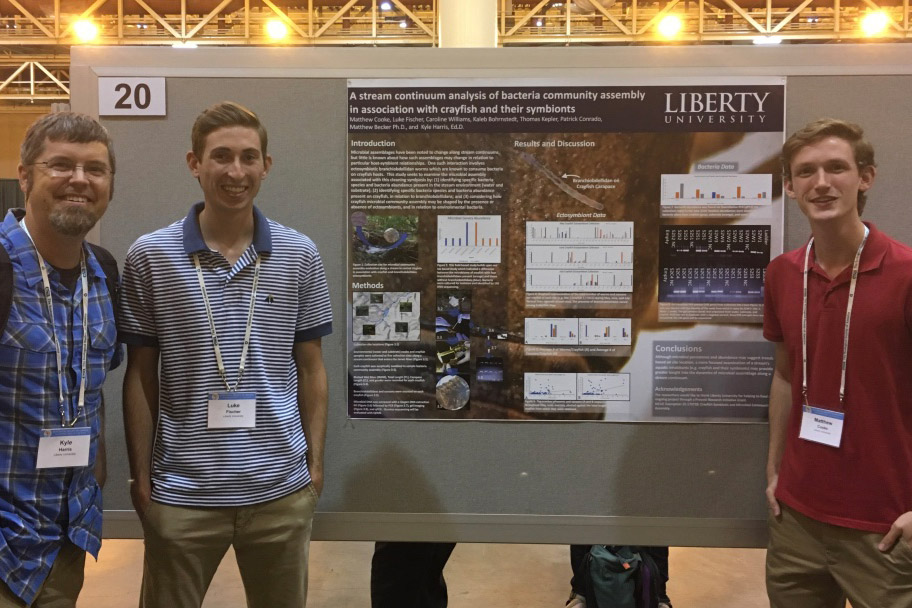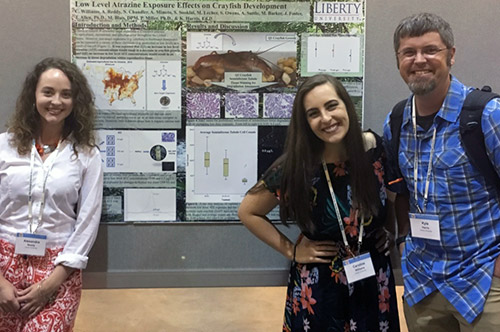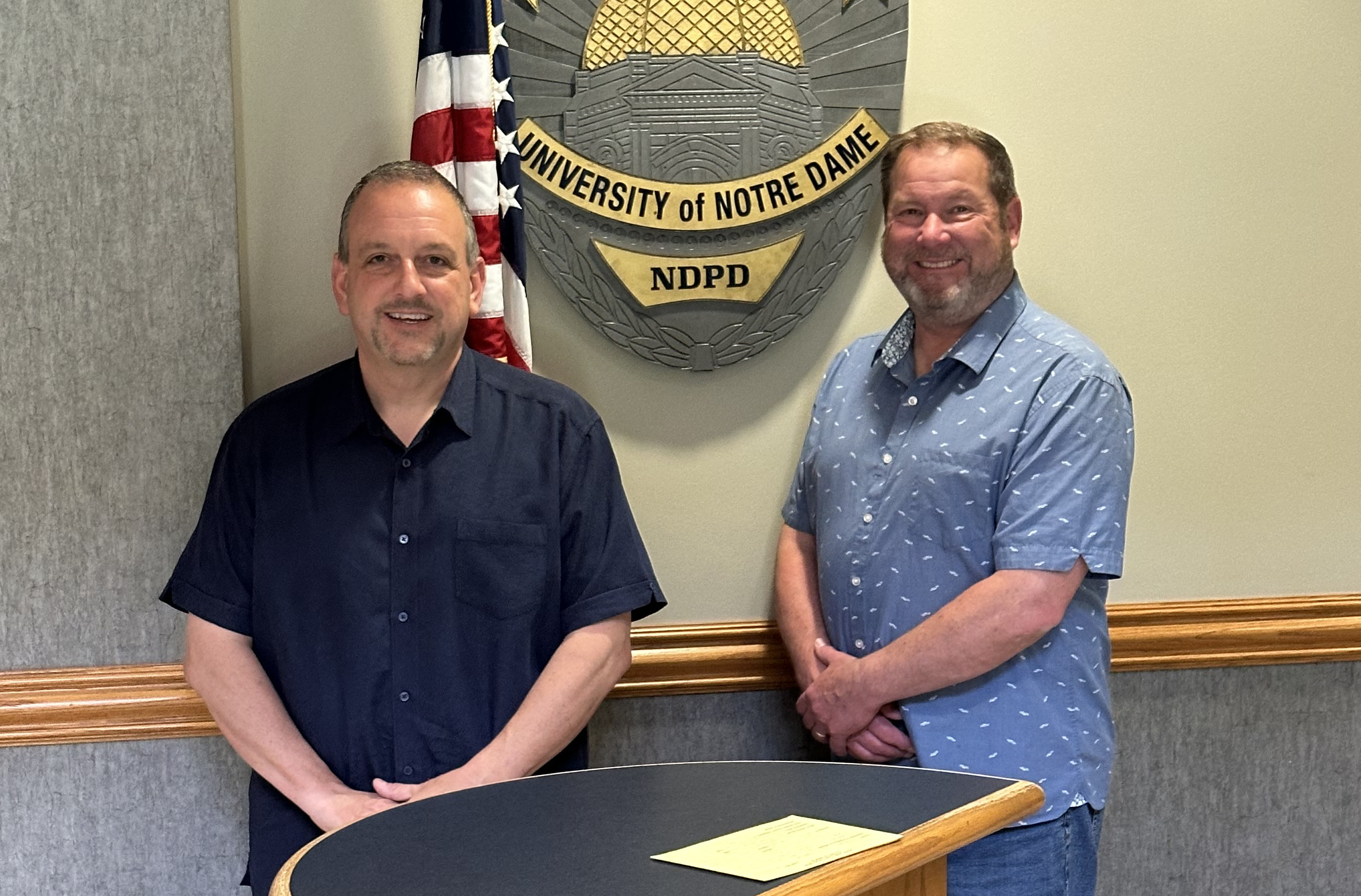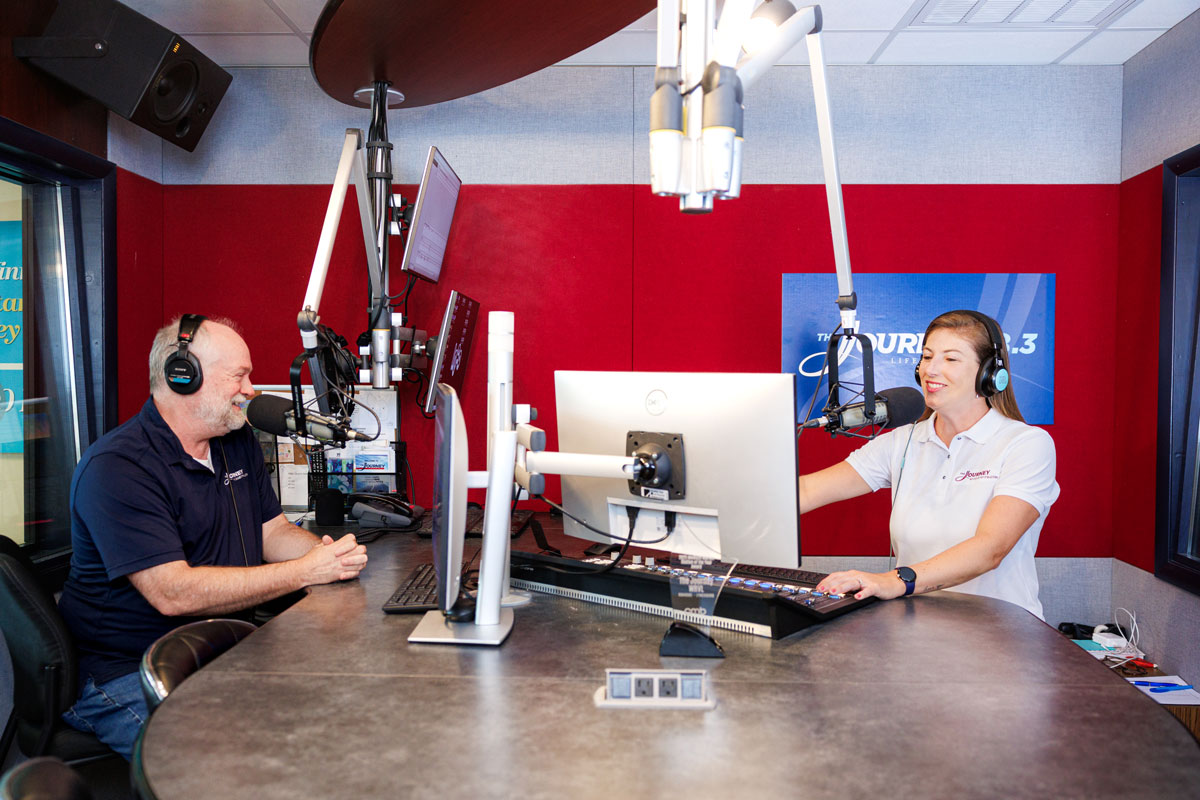Search News Archives
Filter News Articles
Additional Navigation
Biology students share crayfish research at national ecology conference
August 14, 2018 : By Office of Communications & Public Engagement
A group of researchers from Liberty University’s Department of Biology & Chemistry presented their work at the annual Ecology Society of America (ESA) meeting last week in New Orleans, attended by 4,000 scientists from the nation’s largest professional community of ecologists. The trip was sponsored by Liberty’s Center for Research & Scholarship.
 Dr. Kyle Harris, Liberty’s director of organismal and environmental biology, joined four of his undergraduate students — Matthew Cooke, Luke Fischer, Alexandra Reddy, and Caroline Williams. One study that was presented focuses on the symbiotic relationship between crayfish and branchiobdellidans, or worms that live on the body surface of their host. (That research study, supervised by Harris, is now in its third year.)
Dr. Kyle Harris, Liberty’s director of organismal and environmental biology, joined four of his undergraduate students — Matthew Cooke, Luke Fischer, Alexandra Reddy, and Caroline Williams. One study that was presented focuses on the symbiotic relationship between crayfish and branchiobdellidans, or worms that live on the body surface of their host. (That research study, supervised by Harris, is now in its third year.)
“These worms are known to eat accumulating bacteria off of the gills of crayfish,” Harris explained. The students collected bacteria samples from local streams and from crayfish to determine how the worms’ presence made an effect on the species’ health.
Harris and students also investigated the effects of chemicals, such as low-level pesticides, on crayfish development.
Harris said the projects may lead to “a greater understanding of how symbiotic relationships in aquatic systems may be shaped by microbial community assembly and how low levels of pesticides can impact non-targeted organisms.”
 Applications of the research might impact how freshwater ecosystems are monitored and sustained.
Applications of the research might impact how freshwater ecosystems are monitored and sustained.
For the undergraduate students, participating in research and then sharing it at a national gathering of ecologists, many of whom were professional researchers, professors, or graduate students, was an invaluable experience.
“The ESA conference allowed me to learn how to effectively network with professionals across my field to learn better ways to conduct research,” said rising senior biomedical sciences student Matthew Cooke. “Many individuals in attendance at the conference were interested in our work and had suggestions for how to improve our research. We were able to connect with one post-doc (post-doctoral student) with whom we discussed both our research as well as hers at length. Because she had conducted research similar to our project, she was able to give us advice for learning how to use bioinformatics software in the near future.”
Cooke has conducted research with Dr. Harris since he was a sophomore, which has given him a head-start in his aspirations to earn a Ph.D. and teach biology at the university level.
His experience has included DNA extraction, sterilization techniques, PCR (polymerase chain reaction, a technique to amplify a DNA segment by copying it across several orders of magnitude), and gel electrophoresis (a method for separating and analyzing DNA, RNA, and proteins).
“Though Dr. Harris’ expectations sometimes stretch you as a student, the challenges prepare us for graduate-level research,” he said. “After presenting my research poster to the post-doc at the ESA conference, she asked if I was working on my Ph.D. or on my master’s. That helped me to realize and appreciate just how much Dr. Harris has helped me grow professionally.”
Liberty students like Cooke have a number of opportunities to participate in and present scientific research, from studies funded by the National Institutes of Health to forensic DNA studies alongside one of the nation’s foremost experts. Recently, Liberty projects won three first-place awards at the Virginia Academy of Science Annual Meeting.
The Liberty University Department of Biology & Chemistry offers a variety of degree programs to help prepare students for graduate school, professional school (medical, veterinary, dental, pharmacy, etc.), and immediate employment in the workforce through hands-on labs and training in the latest laboratory techniques using state-of-the-art equipment. Several bachelor’s degree programs are offered, including biology, biomedical sciences (pre-med), biopsychology, chemistry, environmental biology, forensic science, and zoology (including pre-vet). Graduate programs include a Master of Science in Biomedical Sciences and a Ph.D. in Anatomy and Cell Biology.


